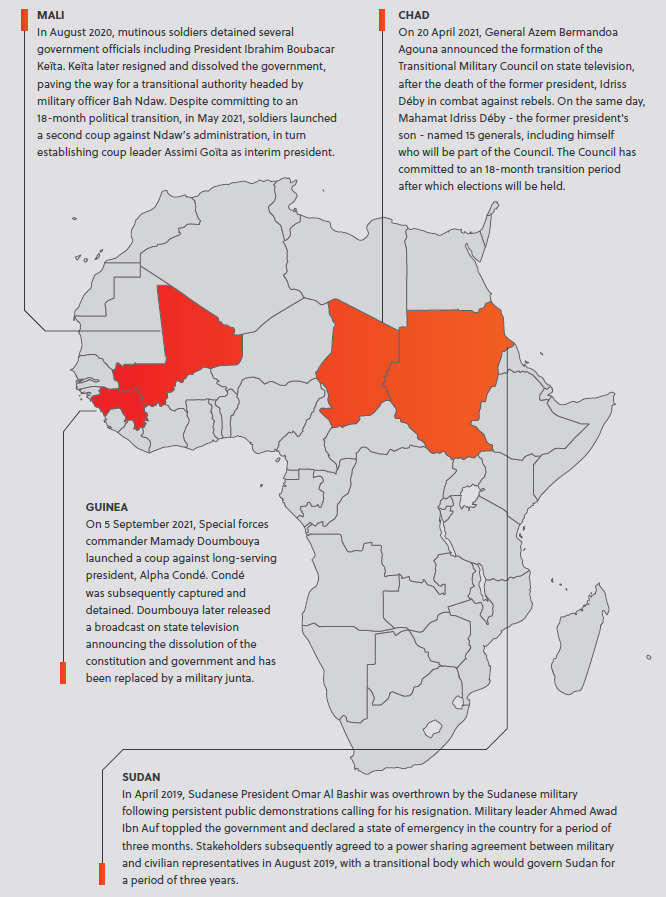Coup'ed up: Political evacuation planning in the era of the comeback coups
Coups d’état have made a comeback on the African continent with three successful coups taking place in Chad, Mali and Guinea in 2021. These followed an earlier coup in Mali in 2020 and the overthrow of long-serving leader, Omar Al Bashir in Sudan back in 2019 with reports of several coup attempts in Gabon, Sudan, Niger and elsewhere in recent years. With unconstitutional changes in government being a persistent threat to security on the continent, as flagged by the African Union, companies operating here will need to develop and maintain robust crisis management and political evacuation plans.
THE ANATOMY OF A COUP
Of course, every country is different and the grievances or greed that drive a military overthrow of a regime are manifold. However, there are a few common threads that run through the most recent coups, and coups historically, that should be the first indication to companies to have a political evacuation plan in place. Across Chad, Guinea, and Sudan, in particular, the respective administrations of Idriss Déby, Alpha Condé and Al Bashir were characterised by the erosion of democratic principles and practices. Political freedoms and opposition forces were increasingly stifled, and power had become concentrated in the hands of a few amid entrenched corruption that undermined the economic prospects of these countries. This monopolisation of the political space had been enforced through fraudulent elections, and the unpopular and at times unlawful extension of presidential term limits. Specifically, since the turn of the century, long serving leaders in 20 African countries have attempted to relax or remove presidential term limits, much to the frustration of their citizens. With citizens protesting on the streets to voice their disgruntlement, the military or factions therein – often themselves keen to secure a piece of the power pie – have been at the ready to intervene. Their motivations aside, when the military does step in, their actions can result in immediate consequences for the country and those operating there.

0 TO 48 HRS POST-COUP: SHUT UP SHOP
In the immediate aftermath of almost any coup, borders are quickly shut, ports of entry are closed and curfews are enforced. In the most recent coup in Guinea in which Colonel Mamady Doumbouya, head of Guinea’s special forces seized power, Conakry’s Gbessia International Airport was shut for 24 hours and a countrywide curfew was enforced between 20h00 and 06h00. This severely restricted the ability of personnel to move in or out of the country. Restrictions on movement are often particularly acute in capital cities where there is likely to be a concentration of military forces. Amid the uncertainty during an unfolding coup and with the likely seizure of state telecommunications limiting the availability of information in-country as well as restrictions on movement, people are often driven by fear to close their places of business and return home to weather the storm. This means accessing essential goods can be near impossible while communications can be severely inhibited.
Preparation therefore is key and should include the prior consideration of communication protocols, preparation of grab bags, and planning around access to medical supplies, food, water and sanitation. Personnel should be informed and rehearsed in the protocols and procedures for sitting tight should a coup crisis arise.
48 HRS TO 4 WEEKS POST-COUP: READING THE SIGNS
As the new military leadership begin to assume their newfound authority, it is increasingly evident in recent cases that the military junta will want to bring international stakeholders and citizens alongside. Commitments to forming an interim authority and (eventually) handing over power to a civilian government will sound promising to international and domestic players alike, but these promises bring with them new uncertainty for the transitional period.
For the business operator, regular, relevant and accurate situation assessments will be paramount in gauging their next steps. If indications are pointing to a contested coup and the potential for violence, be it through civil unrest or factioning armed forces, activating a political evacuation plan when the borders and ports are reopened may prove crucial to the safety of their personnel should the situation deteriorate and the window for departures close.
1 TO 18 MONTHS POST-COUP: ADJUSTING TO THE NEW NORMAL?
Recent coup leaders have agreed to extended transition periods under the genuine commitment or guise of ensuring a peaceful and fair transfer of power. In Chad, the Transitional Military Council which assumed power following the death of Déby in a skirmish with rebel forces in April, has commitment to an 18-month transition period, while in Mali, the latest coup leaders in June said they would respect their predecessors’ February 2022 deadline to hold elections following the previous 2020 coup. And understandably, as the dust settles, operators may be more hesitant to relocate staff or further disrupt operations. Yet, as the second coup in Mali demonstrates, operators should not be too quick to adjust to a new normal. Post-coup countries remain highly vulnerable to further political instability and ongoing monitoring of the operating environment and adjusting security postures and protocols regularly should become commonplace.
